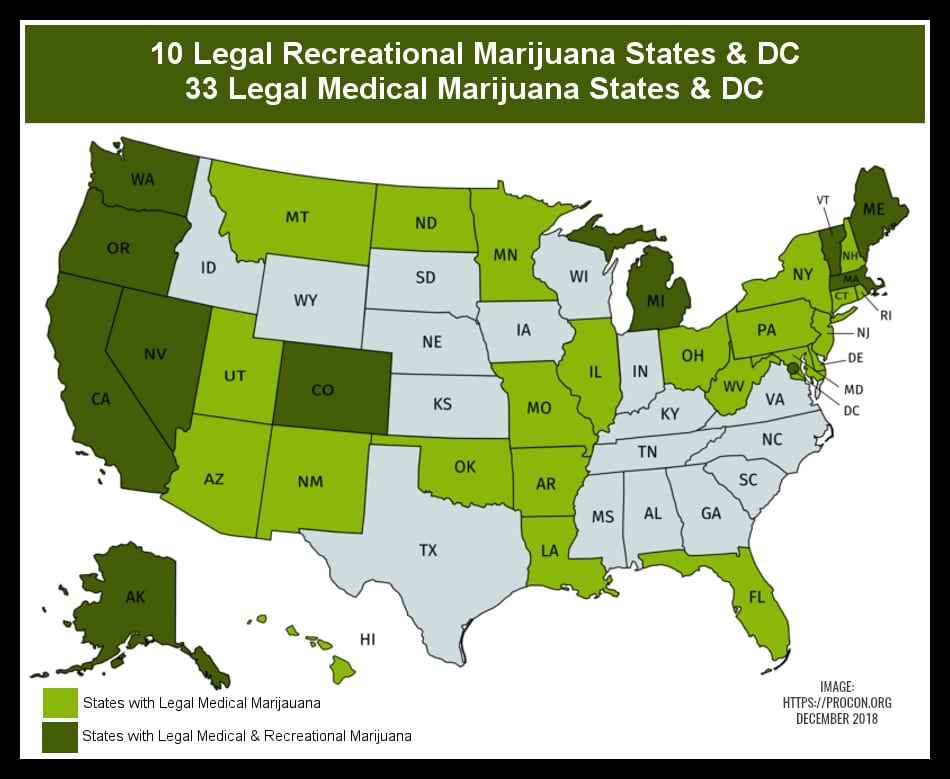In 2016, Florida voters voiced overwhelming support for medical cannabis, approving the Florida Medical Marijuana Legalization Initiative (also known as Amendment 2). The following year, Senate Bill 8A outlined rules for use and administration – including a strict definition of what type of doctor is allowed to recommend (or prescribe) medical marijuana:
‘Qualified physician’ means a person who holds an active, unrestricted license as an allopathic physician under chapter 458 or as an osteopathic physician under chapter 459 and is in compliance with [all] physician education requirements.
Note: Since medical marijuana is still federally classified as a Schedule I substance, and ineligible for FDA approval, the term recommend is used in place of prescribe, as only FDA-approved medications can technically be “prescribed.” However, for ease of understanding, the two terms are used interchangeably below.
What’s the Difference Between a Regular Doctor and a Medical Marijuana Doctor?
While regulations surrounding the requirements for a medical marijuana doctor may seem confusing, Senate Bill 8A simply requires that doctors receive additional training to become certified to recommend medical marijuana. These medical professionals maintain the same qualifications as other doctors, but add to their education in order to recommend medical marijuana when it is necessary for patient care.
Senate Bill 8A defines the educational requirements for medical marijuana doctors as follows:
Before being approved as a qualified physician […] and before each license renewal, a physician must successfully complete a 2-hour course and subsequent examination offered by the Florida Medical Association or the Florida Osteopathic Medical Association which encompass the requirements of this section and any rules adopted hereunder.
The course and examination shall be administered at least annually and may be offered in a distance learning format, including an electronic, online format that is available upon request. The price of the course may not exceed $500.
A physician who has met the physician education requirements of former s. 381.986(4), Florida Statutes 2016, before the effective date of this section, shall be deemed to be in compliance with this paragraph from the effective date of this act until 90 days after the course and examination required by this paragraph become available.
There are also additional regulations in place regarding medical marijuana doctors to protect patients who may be seeking medical cannabis care:
A qualified physician may not be employed by, or have any direct or indirect economic interest in, a medical marijuana treatment center or marijuana testing laboratory.
The excerpt above ensures that medical marijuana doctors do not have any personal stake in recommending medical marijuana treatment. By eliminating any possibility for financial gain or benefit, this legislation helps to make sure that doctors are only recommending medical marijuana when it is in a patient’s best interest.
What Conditions Qualify for a Medical Marijuana Prescription?
Although the term prescription is often used to describe doctor-recommended medications, this phrasing is not technically appropriate for medical marijuana. Due to FDA regulations and conflicting federal and state laws, medical marijuana prescriptions are referred to as recommendations. Medical marijuana treatment differs from traditional prescription medications, as the process to begin use requires government approval.
Before you can begin treatment, the Florida Department of Health must review a recommendation given by a certified medical marijuana doctor, which requires diagnosis of a qualifying condition.
If you have been diagnosed with one of the following conditions, you may be eligible for medical marijuana treatment:
In addition to the conditions above, Florida medical marijuana doctors may also recommend medical marijuana for the treatment of other “diagnosable, debilitating conditions of like, kind, or class.” This can include conditions such as chronic nonmalignant pain, terminal conditions, and anxiety.
For a full list of conditions that may qualify for medical marijuana treatment, please refer to: Qualifying Conditions.
What states allow doctors to prescribe marijuana?
Once you qualify for medical marijuana and begin your treatment, you will be free to use medical cannabis, as recommended, within the state of Florida.
Although marijuana is still classified as a Schedule I substance, and highly regulated at the federal level, a number of other states have now legalized its medical use, including those highlighted on the map below:

Depending on the state, the possession and use of medical cannabis may be illegal, even if you have a Florida-issued medical marijuana card.
Under federal law, it is illegal to take cannabis across state lines, which can put patients in a tough spot. Fortunately, there are a few options for medical marijuana patients, depending on the travel location.
For example, if you are in a state where recreational marijuana is legal, you can purchase marijuana from a dispensary. This will not require possession of your medical marijuana card, but you will have to be of legal age.
Several states that have legalized medical marijuana practice reciprocity laws, allowing medical marijuana use if you possess an out-of-state medical marijuana card. As long as you have your Florida-issued medical card, you will be able to use medical marijuana in the following states:
- Arizona
- Michigan
- New Hampshire
- Rhode Island
However, only Michigan allows non-residents to purchase medical marijuana from authorized dispensaries.
For more information, see: Can I Use My Medical Marijuana in States Where It’s Not Legal?.
Where Can I Find a Medical Marijuana Doctor?
CannaMD is Florida’s leading medical cannabis clinic, with convenient statewide locations, including:
- Fort Lauderdale
- Gainesville
- Jacksonville
- Miami
- Orange City
- Orlando
- Tampa
- The Villages
- West Palm Beach
For a full list, please see: CannaMD Locations.
In accordance with state law, all CannaMD doctors hold an active, unrestricted license as either an allopathic physician or osteopathic physician and are in compliance with all state-mandated education requirements.
Also in line with Senate Bill 8A, CannaMD physicians are not employed by, and do not have any direct or indirect economic interest in, any medical marijuana treatment centers or marijuana testing laboratories.
CannaMD is committed to providing compassionate care to Florida patients through evidence-based application of medical cannabis research. Centered around education, empathy, and exceptional customer service, CannaMD offers an unparalleled patient experience – empowering Florida residents to pursue a better quality of life!




